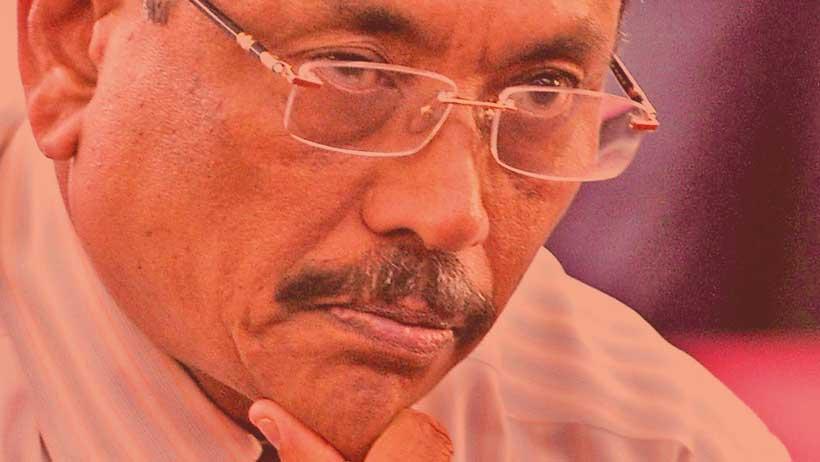24 Jun 2023 - {{hitsCtrl.values.hits}}

 Former Sri Lankan President and ex-defence secretary Gotabaya Rajapaksa known generally as Gota figured prominently in an Associated Press (AP) news report dated June 22, 2023. According to AP, Gotabaya Rajapaksa has been accused of allegedly “tampering with police records in order to hamper investigations into mass graves discovered in an area where he was a military officer at the height of a bloody Marxist insurrection in 1989”. The allegation was made in a report released last week by activist groups including the International Truth and Justice Project, Journalists for Democracy and Families of the Disappeared in Sri Lanka.
Former Sri Lankan President and ex-defence secretary Gotabaya Rajapaksa known generally as Gota figured prominently in an Associated Press (AP) news report dated June 22, 2023. According to AP, Gotabaya Rajapaksa has been accused of allegedly “tampering with police records in order to hamper investigations into mass graves discovered in an area where he was a military officer at the height of a bloody Marxist insurrection in 1989”. The allegation was made in a report released last week by activist groups including the International Truth and Justice Project, Journalists for Democracy and Families of the Disappeared in Sri Lanka. The report alleged that Gota Rajapaksa while serving as Defence Secretary under his brother President Mahinda Rajapaksa had “ ordered the destruction of all police records older than five years at police stations in the region after mass graves were discovered in the Matale District of central Sri Lanka in 2013.”
It is well-known that Gotabaya Rajapaksa was appointed commanding officer of the 1st Battalion, Gajaba Regiment (1GR) and military coordinating officer of the Matale District during the second insurrection of the Janatha Vimukthi Peramuna (JVP) which took place from 1987 to 1990.Gota reportedly functioned in Matale District from May 1989 to January 1990. “He (Gota) was posted to Matale as the District Coordinating Officer tasked with bringing the JVP under control,” wrote well-known journalist and former envoy to the UN in Geneva, C.A. Chandraprem in his biography “Gota’s War”.
In a significant development last year, four key representatives from UN-related agencies wrote a joint letter to Sri Lankan President Ranil Wickremesinghe on November 8, 2022. The UN missive provided particulars about the Matale incidents of 1989/90 and requested a comprehensive response from the Sri Lankan Government. The UN joint letter was made available in the public domain on January 9, 2023. In keeping with certain protocols, the UN redacted the name of the official in charge of Matale District in 1989/90. Relevant paragraphs from the UN letter are reproduced below:
“We have the honour to address you in our capacities as Working Group on Enforced or Involuntary Disappearances; Working Group on Arbitrary Detention; Special Rapporteur on extrajudicial, summary or arbitrary executions and Special Rapporteur on the promotion of truth, justice, reparation and guarantees of nonrecurrence.
According to the information received: Between May 1989 and January 1990, Government security forces in the Matale District allegedly carried out enforced disappearances, arbitrary and unlawful detentions, and extra-judicial killings, in the context of escalating violence between the Janatha Vimukthi Peramuna (JVP) and the Government of Sri Lanka.
Starting in 1989, Commissions of Inquiry were set up by the Government to investigate human rights violations that had reportedly occurred during, and subsequent to, the uprising. The Commissions received complaints alleging enforced disappearance, torture, extra-judicial killings, and arbitrary and lawful detentions that had been carried out by security forces in the Matale District.
The information received points to and the security forces under his control (mostly the “Gajaba Regiment”) as the main perpetrators. According to the Commission’s reports, would have known about the scale of violence in the small district of Matale, which only had a population of 350,000 at the time.
The Commissions documented 1,041 cases of enforced disappearance in the Matale District, from which more than 700 cases occurred between May 1989 and January 1990.
The list includes army and police officers under his command who reportedly had been present at various detention sites, as well as schools and guest houses known as “notorious torture sites”.
Evidence was also collected from former detainees who had survived detention in army or police custody at Vijaya College Army Camp and other places of detention in Matale District. Prisoners testified to being blindfolded and beaten, including while “being hung upside down”, and “being forced to inhale chilli fumes.”
The Commissions documented one specific case of a victim who was arrested in September 1989 and held at Vijaya College Army camp for a period of 40 days and brutally tortured while in detention. The Commissions also collected evidence of extra-judicial killings of civilians during this period, many of whom would have been arbitrarily and unlawfully detained and taken into custody.
While we do not wish to prejudge the accuracy of these allegations, we express our serious concern at the alleged enforced disappearances, arbitrary detentions, torture, and extra-judicial killings, reportedly committed by Government security forces between May 1989 and January 1990, in the Matale District, and the ensuing lack of accountability and judicial action against the alleged perpetrators of these human rights violations.
Please accept, Excellency, the assurances of our highest consideration.
| According to AP, Gotabaya Rajapaksa has been accused of allegedly “tampering with police records in order to hamper investigations into mass graves discovered in an area where he was a military officer at the height of a bloody Marxist insurrection in 1989 |
Three important aspects concerning the suppression of the JVP revolt in Matale District have been highlighted in this UN letter.
Firstly 1,041 cases of enforced disappearances in Matale District have been documented through four commissions of inquiry. Of these more than 700 allegedly occurred when Gota was in charge as the chief military officer.
Thirdly the names and designations of those allegedly responsible for the Matale “disappearances” have been placed under a government secrecy order set up to run until 2030. This is an indicator of institutionalised impunity.
| The mass graves were suspected to date from the time of a violent Marxist insurrection in 1989, when Rajapaksa, as a military officer, was involved in counter-insurgency in the region |
However, Gota’s “command” role in Matale District and the circumstances under which he was placed in charge by a UNP Government is recounted by C.A. Chandraprema in his book “Gota’s War”. The following are excerpts from pages, 173, 174 and 177 in the book’s Chapter 28 titled “The second JVP insurrection”.
“On May 1, 1989, with Colonel Wimalaratne being promoted to the rank of Brigadier, Gota was made the commanding officer of the 1st Battalion of the Gajaba Regiment. This was now a permanent appointment unlike the temporary command he held during the Vadamarachchi operation.”
| 1,041 cases of enforced disappearances in Matale District have been documented through four commissions of inquiry. Of these more than 700 allegedly occurred when Gota was in charge as the chief military officer |
“When Gota was appointed coordinating officer of the Matale District, the ruling party politicians of that area had complained to the powerful Deputy Defence Minister Ranjan Wijeratne that Gota was Mahinda Rajapaksa’s brother and that they had no faith in him”.
“At that time, Mahinda Rajapaksa was back in parliament after an interval of 12 years and was a vocal critic of the manner in which the UNP government was handling the JVP insurrection.
“Brigadier Wimalaratne had explained to Wijeratne that Gota had fought in Vadamarachchi and given him details of other operations that he had carried out. Wijeratne had agreed that Gota should not be removed from his position.”
“After Gota took over the Matale District, detachments were posted in every strategically important location.”
D.B.S. Jeyaraj can be reached at [email protected]
30 Dec 2024 10 minute ago
29 Dec 2024 1 hours ago
29 Dec 2024 4 hours ago
29 Dec 2024 4 hours ago
29 Dec 2024 6 hours ago